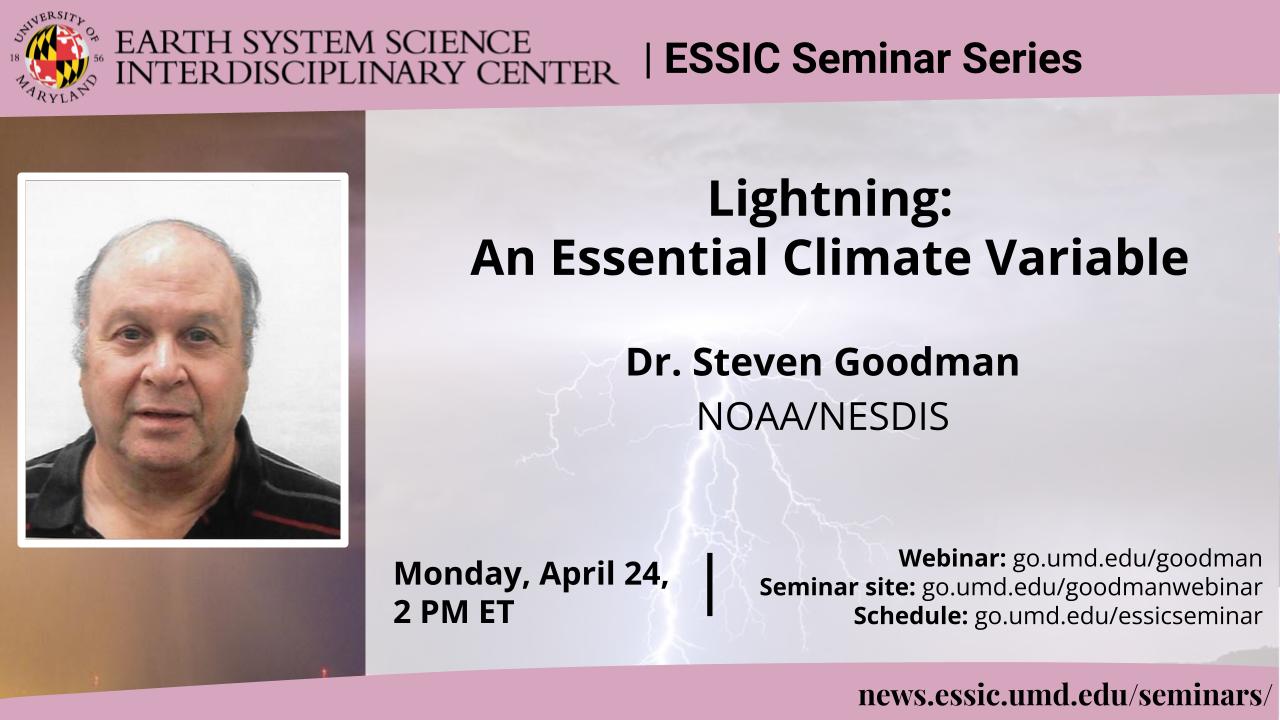
Lightning: An Essential Climate Variable

Dr. Steven Goodman
NOAA/NESDIS
Monday April 24, 2023, 2 PM ET
Abstract:
Lightning is perhaps the most common natural hazard on Earth with an estimated 1.5 billion flashes occurring annually worldwide. Earth’s daily lightning hot spot is Lake Maracaibo, Venezuela with more than 300 days with lightning each year. Early mariners gave this region the nickname “Lighthouse of the Catatumbo” as it served as a natural navigation beacon due to the prolific nocturnal lightning that occurred at the mouth of the Catatumbo River that drained into the lake from the surrounding mountains. Recent observations of lightning at high latitudes indicate an increasing trend since 2017 that may be linked to a warming Arctic. In 2016 the UN World Meteorological Organization (WMO) with the Global Climate Observing System (GCOS) Atmospheric Observations Panel on Climate (AOPC), formed a Task Team to determine the requirements for lightning to be designated an Essential Climate Variable (ECV). The datasets provide the empirical evidence needed to understand and predict the evolution of climate, to guide mitigation and adaptation measures, to assess risks and enable attribution of climate events to underlying causes, and to underpin climate services. This presentation will discuss the lightning observations for climate and the related initiatives to reprocess the multi-decadal record of global satellite observations and highlights from the report on lightning and climate in the forthcoming Bulletin of the AMS 2022 Supplement on the State of the Climate.
Biosketch:
Dr. Goodman chairs the WMO-GCOS Task Team on Lightning which is tasked to establish stewardship of the space-based optical and ground-based RF observations of lightning to produce a global climatological data set for the research community. Dr. Goodman has authored more than 80 peer reviewed papers and books on high impact weather, lightning, precipitation, and climate variability and change during his more than 40-year career with NASA and NOAA. He retired in 2017 from NOAA NESDIS as a Senior Scientist and member of the NOAA Council of Fellows. His involvement with the programmatic aspects of climate science began during a stint at NASA Headquarters in 2003 as a Program Executive supporting the interagency team that developed the first 10-year plan for the United States Group on Earth Observations (USGEO). USGEO is a Subcommittee under the White House National Science and Technology Council’s (NSTC) Committee on the Environment (CE). Dr. Goodman previously served as the Chief Scientist for NOAA’s Geostationary Operational Environmental Satellite (GOES-R) Program and as a member of the NOAA and NASA space-based (GEO and LEO) lightning mapper instrument teams. Today he is a Senior Program Advisor to NOAA and NASA for the next generation follow-on to the GOES weather satellite series.
Webinar:
Event site: https://go.umd.edu/goodman
Zoom Webinar: https://go.umd.edu/goodmanwebinar
Zoom Meeting ID: 958 2284 7450
Zoom password: essic
US Toll: +13017158592
Global call-in numbers: https://umd.zoom.us/u/aMElEpvNu
For IT assistance:
Cazzy Medley: cazzy@umd.edu
Resources:
Seminar schedule & archive: https://go.umd.edu/essicseminar
Seminar Google calendar: https://go.umd.edu/essicseminarcalendar
Seminar recordings on Youtube: https://www.youtube.com/user/ESSICUMD

